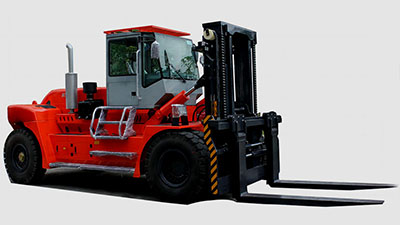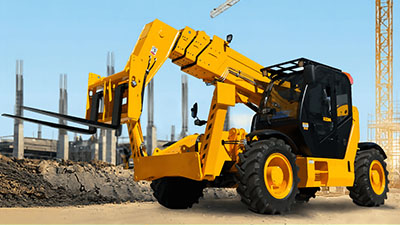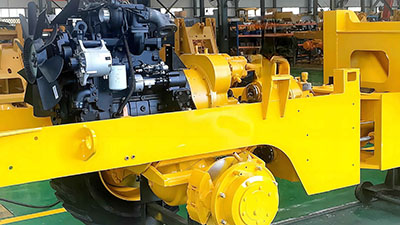How to properly maintain heavy lifting transport equipment?
A competent approach to the maintenance of equipment begins from the moment of its acquisition. First of all, you need to ask if the training of operators and repair specialists is included in the list of services of the manufacturing company, and whether it is effective enough. With proper maintenance, the machine will suit you in terms of productivity and profitability.
But this, of course, is not the only important advice that can be useful to managers responsible for the maintenance of heavy road construction equipment, or managers of foreign companies leasing special equipment. Therefore, we will examine this issue in as much detail as possible.
Diesel
Diesel engines are installed in almost all types of self-propelled construction equipment. They are often negatively affected by significant temperature fluctuations. The operator’s maintenance manual for the special equipment contains a detailed description of the maintenance of each system and diesel engine assembly, and it indicates the frequency of work in engine hours.
The “heart” of the machine will always work properly only under the condition of constant checks and daily performance of some simple operations. Before the operator gets into the cab and goes to work, the machine must be inspected by an experienced mechanic.
Fuel transfer
In order for a diesel engine to remain operational for a long time, a condition is necessary: fuel must be supplied unhindered and continuously. Therefore, during maintenance, it is necessary to check the tightness of the fuel lines and inspect the pipes for kinks and dents. Care must be taken to ensure that the fuel does not contain water, since it is precisely because of its presence that the injection system most often fails.
Keep the fuel filters clean for traces of water. The vast majority of filters produced by the industry can retain dirt, but not water (only a minimal amount is allowed). The problems occur because in the boost pump, moisture emulsifies with the fuel, and the resulting emulsion passes through the filter.
If, while inspecting the fuel filter, you see traces of water, then most likely it has already penetrated into the injection system. In this case, flush the entire fuel transfer system using fresh, good quality fuel. This problem can also be solved by using a special alcohol-containing composition, but it is better not to do this, as it contributes to an increase in carbon deposits on the valves and leads to corrosion of parts.
Drain the water sediment from the tank, replace the fuel filter, refuel with water-free fuel, and start the diesel engine to run for a few minutes. It would be better if you put an additional filter at the outlet of the fuel tank – it will better protect the power system and will trap dirt and rust particles.
Air intake
The pledge of a long service life of a diesel engine is also in the unhindered supply of purified air. If the intake air duct is not tight enough, the sucked-in dust will drastically reduce the life of the diesel engine: hard particles will begin to “cut” the cylinder from the inside. Therefore, when carrying out maintenance, it is imperative to check the air path completely and monitor its tightness. It can be broken if the clamp loosens or the air duct cracks. You also need to check the air filters and, if necessary, clean or replace their elements. In addition, check the joints and corrugations for tightness.
Cooling system
It must be filled with an ethylene glycol based fluid that contains a minimum amount of silicate. The system should be thoroughly cleaned with a high cleaning agent and topped up with fresh fluid with inhibitor additives every couple of years or every 1200 hours. It is extremely important to replace the thermostats. Every 500-600 hours, it is desirable to subject the coolant to a chemical analysis. Also, put in the maintenance program the replacement of hoses, which often crack, swell and wear out.
If you do not monitor the cleanliness of the surface of the radiator, this can cause a number of problems. Clean it of all dirt, especially paying attention to the core plates. Make sure that the radiator plates do not have nicks, and if they appear, then straighten them. Make sure all duct panels are in place. In addition, you need to check the degree of wear of the fan drive belt so that it does not slip on the pulley.
The listed amount of work seems quite large, but in fact they do not take much time and, by performing them, you will significantly extend the life of the equipment.
Gas distribution mechanism
Many users do the wrong thing by forgetting to adjust the valve clearance. If it is too narrow, it will not compensate for the thermal expansion of the parts. Proper adjustment of the engine allows it to start faster, while it develops maximum power, and the risk of overheating is reduced. Valve clearance adjustment should be done as often as required by the instructions.
electrical equipment
The battery is the most important part of electrical equipment. Checking the battery is necessary to ensure the performance of the machine. For a battery to last a long time, it must be fully charged. If the degree of charge is in doubt, check the contacts connecting the wires to the generator and battery. It should not be forgotten that the terminal is easier to protect than to repair.
Often this problem occurs due to poor fan belt tension. If the contacts and the belt are in order, the alternator or regulator relay should be replaced. Keep an eye on the condition of the starter: it must be reliable, and the wires of the glow plugs must not have any signs of corrosion. Don’t forget to check the fuses too.
Equipment lubrication
This is a very laborious work that requires special care. The degree of efficiency of the lubrication process was originally incorporated in the design of the machine. When choosing the model of equipment that is best for your needs, try to find out how well the design allows you to maintain it. If the hydraulic tank is too small, there are too few grease fittings and they are located incorrectly, if the heat dissipation is not properly organized, then this is bad. Moving surfaces will not be well lubricated and this can cause many breakdowns.
It is extremely important to choose the right lubricant for your specific operating conditions. It is desirable if you follow the manufacturer’s recommendations with maximum accuracy. Sometimes manufacturers recommend using only those lubricants to which they have assigned their name. They argue that if they are used, it will maximize the life of the equipment. But usually, machine manufacturers advise using well-known brands.
In any case, if you have not found a lubricant that meets the manufacturer’s requirements, choose the most similar in terms of parameters.
Engine oil
Sometimes it is difficult to find out how much sulfur is in the fuel of the region in which the diesel is to be operated. In this case, and also if you know for sure that it contains more than 0.5% sulfur, choose an engine oil with a higher TBN (alkalinity index). The higher the quality of the oil, the less carbon deposits are formed in an engine that runs on fuel with a high sulfur content. And this, in turn, reduces downtime and the cost of repairing special equipment.
The combustion of fuels with a high sulfur content creates harmful substances for the engine. As a result, the useful additives contained in the base oil lose their properties, and this accelerates the corrosion of engine parts.
Gear oils
Don’t forget to choose the right gear oil. This will also save money and reduce machine downtime. Transmissions produced in recent years have a large power transmission ratio (PTF), and if it becomes necessary to replace the transmission, its cost may exceed the cost of the engine.
Thanks to modern materials (for example, fluoroplastics), KPM has improved, but they are not “friends” with engine oils, which many users use in transmissions. Getting on the fluoroplastic, they make it brittle, which can shorten the life of the transmission. Even before it fails, the oil can create too high temperatures in the clutch, causing it and the planetary gear to fail faster. And this, accordingly, will reduce the CPM of a machine operating at high loads.
Most modern diesel engines are characterized by increased power and reduced transmission sizes (in order to improve the ease of repair). Today, a number of grades of fuels and lubricants are produced that are suitable for various engines and transmissions, and you can easily choose the right fuel and lubricants without much difficulty, thereby saving a lot of money.
Hydraulic systems
It is not difficult to understand the principle of the hydraulic system, but it is not easy to maintain it. There are many reasons why pumps can fail: for example, too low or too high pressure, oil leakage. Often, the operator, in order not to waste time identifying and eliminating the causes of the problem, corny adds oil to replace the leaked one, and even using the cheapest grade.
If you work with this approach to business, it can entail considerable costs. Today you can buy hydraulic oil of any type, however, choosing it, you need to be guided by the technical requirements of the hydraulic manufacturer.
Tank size also matters. With its correct selection, the hydraulic pump should work for about 10 minutes.
In the conditions of construction or road works, the pressure in the hydraulics often rises and “rolls over”, in addition, the oil temperature also rises. Remember that every extra 10°C cuts the life of the oil in half. In addition, because of this, solid sludge is formed, which clogs technological gaps and accelerates corrosion processes. The system can also overheat when using oil of the wrong viscosity, improper fitting of hydraulic pump parts, dirty heat exchanger or oil leakage.
But most often hydraulics break down as a result of rare or illiterate maintenance. In order for the hydraulic system to serve for a long time, first of all, it is necessary to monitor the cleanliness in the system and the filtration of oil in it. In order to prevent or at least minimize clogging, it is necessary that competent and experienced workers are engaged in maintenance and management of the equipment itself. If basic training is neglected, it can become a serious threat to your business.
Grease
Any experienced worker knows that if grease is applied incorrectly, joints, bearings, and joints can quickly wear out. Therefore, not taking into account purely design flaws, the equipment manufacturer is not the culprit of breakdowns.
Grease has a complex composition, which, when exposed to heat and time, loses its properties. It is advisable to store grease in a closed container, and not more than a year. In an unusable lubricant, oil begins to separate from the thickener, and a crust with cracks appears on its surface.
Grease must not be stored outdoors in a barrel with the cap up. Even a hermetically sealed cork eventually begins to let precipitation through. If you do not have a suitable room or at least a shed, then store the barrel in a position on its side.
Maintenance efficiency guarantee
Maintenance of equipment must be carried out in a timely manner and in full. This is the most important point, especially for lubrication. If you have the opportunity, entrust preventive maintenance to the computer, but even if you keep records of the frequency of work in the usual way (keeping a preventive maintenance log), make sure that the maintenance program is completed on time, efficiently and in full. Remember that prevention is always cheaper than repair!






